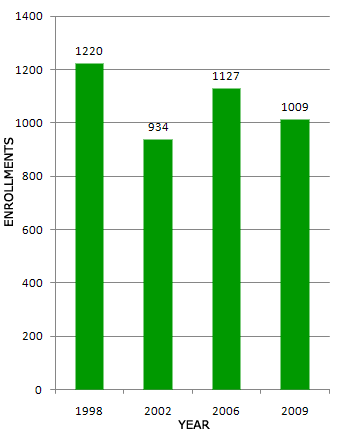Although the number of people studying Mandarin in the United States has continued to rise (more about that in a later post), enrollments there in graduate courses in Mandarin have declined.
No. of U.S. Graduate School Enrollments in Mandarin from 1998 to 2009

Grad School Enrollments in Mandarin as a Percentage of Total U.S. Post-Secondary Enrollments in Mandarin
Here’s something I wrote the last time I addressed this topic.
The much-ballyhooed but also much-deserved increase in students studying Mandarin has all been at the undergraduate level. Given that the grad enrollment as a percentage of total enrollment for Mandarin is about the same as that for French (2.63 percent and 2.73 percent, respectively) it might appear that Mandarin has simply reached a “normal” ratio in this regard. But native speakers of English generally need much more time to master Mandarin than to master French. Simply put, four years, say, of post-secondary study of French provides students with a much greater level of fluency than four years of post-secondary study of Mandarin.
Also, there is a great deal more work that needs to be done in terms of translations from Mandarin. I do not at all mean to belittle the work being done in French — or in any other language…. I just mean that Mandarin has historically been underrepresented in U.S. universities given the number of speakers it has and its body of texts that have not yet been translated into English. U.S. universities need to be producing many more qualified grad students who can handle this specialized work. And right now, unfortunately, that’s not happening.
That still holds, except that grad enrollment as a percentage of total enrollment for Mandarin is even lower than before (1.96% vs. 2.37% for French, 1.99% for Spanish, and an impressive 4.68% for Korean).
sources:
- Enrollments in Languages Other Than English in United States Institutions of Higher Education, Fall 2009, Modern Language Association of America, December 2010
- US post-secondary enrollments in foreign languages and the position of Mandarin, Pinyin News, August 18, 2008

